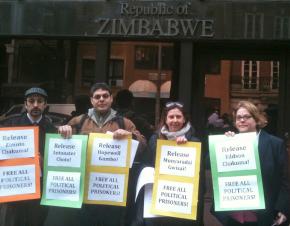Picketing for the jailed socialists in Zimbabwe
and report on protests for jailed Zimbabwe socialists.
ACTIVISTS IN Washington, D.C., held small but important pickets March 9 in solidarity with six still imprisoned Zimbabwean socialists who were among 45 arrested for the "crime" of watching a video presentation about the revolutions in Egypt and Tunisia. The six are still behind bars and face charges of treason, which is punishable by the death penalty.
In Washington, D.C., members of the International Socialist Organization and Amnesty International picketed the Zimbabwe embassy, chanting "Free speech is not a crime, why are activists doing time?" and "Mugabe says death row, we say hell no!"
Though it took place in the relatively straight-laced DuPont Circle neighborhood, activists received many thumbs-up and words of support from passersby. Though the turnout was fairly small, Zimbabwean officials took notice of our presence. At one point, a representative from the embassy came out, and we demanded the release of the remaining activists. A friendly UPS employee smuggled in one of our signs.

In New York City, chanting rang out at a small but spirited rally outside the Zimbabwean mission.
One of the detained activists, Munyaradzi Gwisai, is a former member of parliament as well as a leading socialist organizer. At the protest, Tapiwa, a Zimbabwean immigrant, shared his memories of Gwisai: "Gwisai was really popular. He was one of the founding members of the opposition. I'm not an activist, but I did support the opposition because I believed in what they stood for. Basically, he stood for the right to democracy in my eyes. "
Tapiwa went on to describe the confusing way his country is portrayed in the international media:
Yusef Khalil, an organizer in the Egypt solidarity movement, explained why he came to the protest:
At an event last week in Brooklyn, a Tunisian woman mentioned the excitement and solidarity she experienced in Senegal at the time that Ben Ali fled Tunisia. She recounted the reaction of a South African poet friend of hers when she told him that Tunisians successfully kicked out Ben Ali: it was like telling him that we had ended apartheid all over again. Up until then, I hadn't thought of the revolutions in their African context. Not only are Arabs proud of their achievement, but Africans are proud and inspired as well.
At the beginning of the protest, a delegation went inside the mission to deliver a statement demanding the activists' release. They met with an official who accepted the statement, but refused to give his name and patronizingly told the activists they were being misled by the U.S. media. The delegation assured the official that we would be back until the six activists are released, then rejoined the protest outside.
The protest was small in part because it was called on short notice as an emergency response. But it's also true that there have not been mass protests within Zimbabwe itself since dictator Robergt Mubage cracked down on opponents after the 2008 election that he was widely believed to have lost.
But the Zimbabwean government's wildly disproportionate response to a simple meeting about Egypt and Tunisia reflects its fear than the North African revolutions will move southward. "I don't think [Egypt and Tunisia] will have an immediate impact in Zimbabwe," said Tapiwa. "But it's only a matter of time, because something's got to give."


